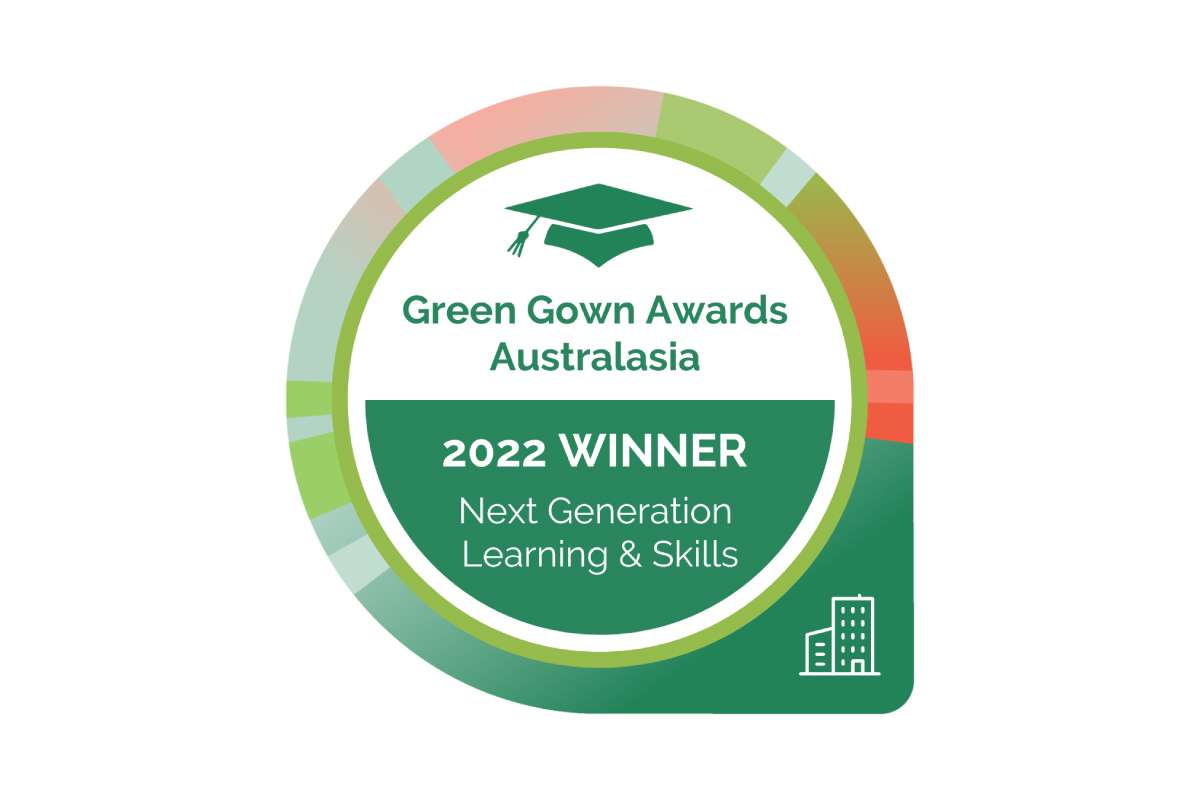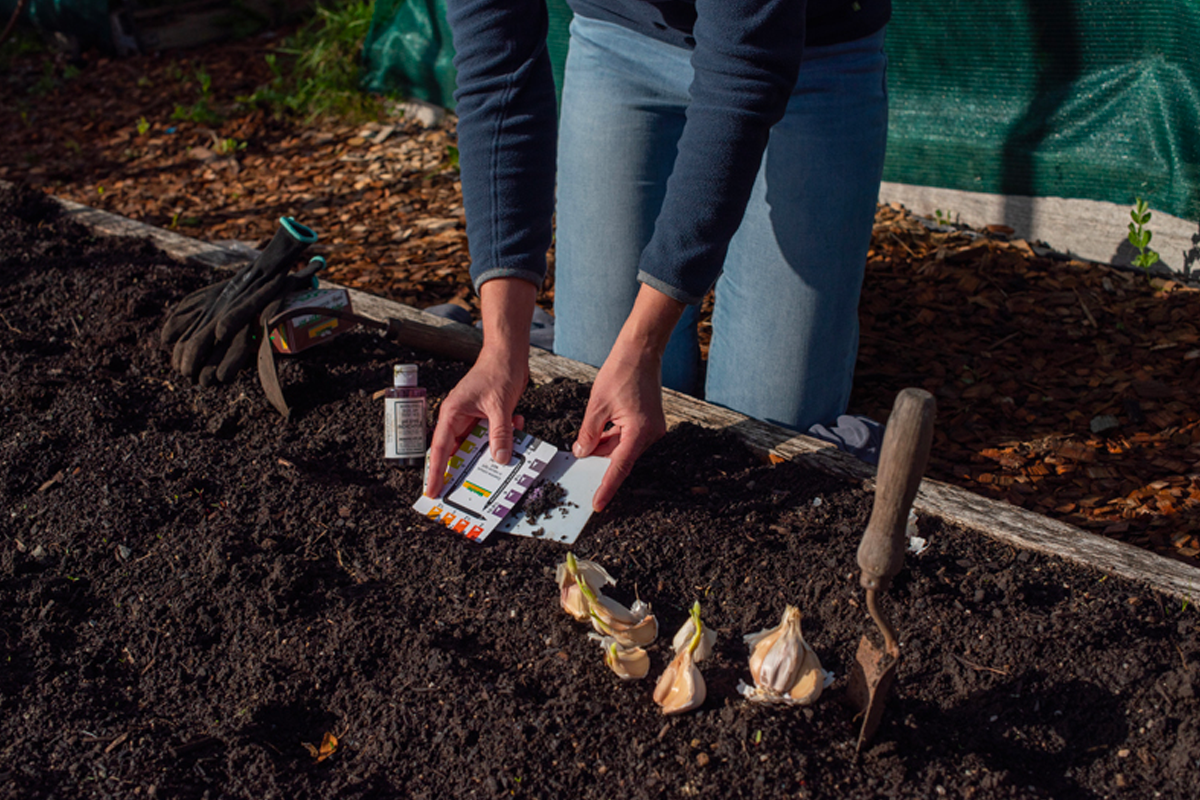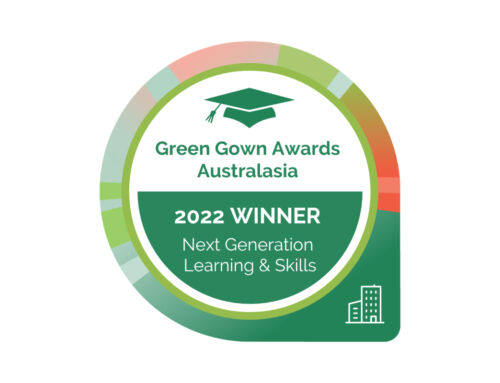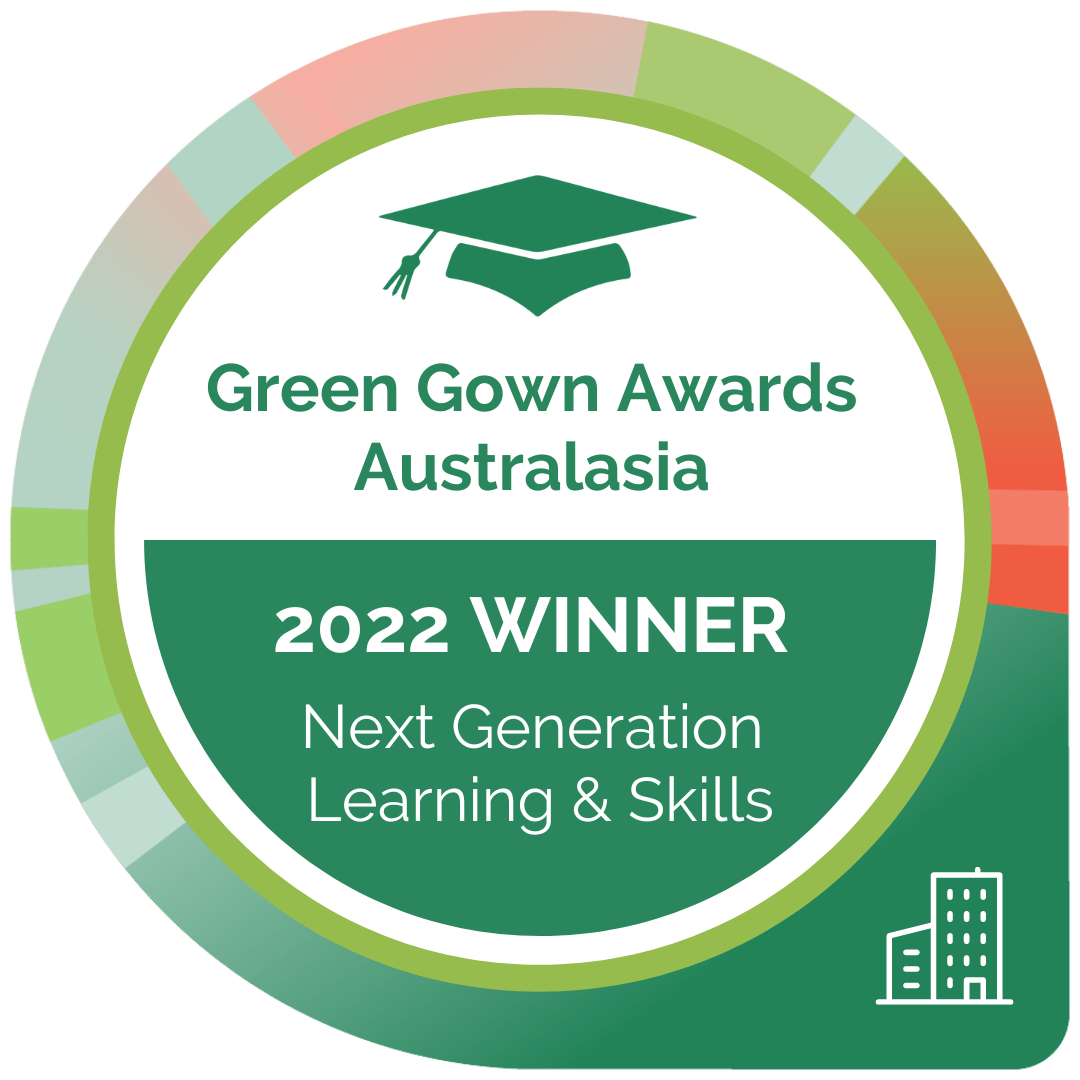
Massive online courses delivering individual and community sustainability country wide
The Diploma and Undergraduate Certificate in Sustainable Living are fully online courses developed by the University of Tasmania, starting in 2018. They aim to create a very broad understanding of the concepts, implications, and relevance of sustainability but are founded on rigorous academic knowledge. The courses have made substantial and new contributions to education in sustainability by reaching over 6,000 students to date, mostly from parts of the community that are poorly served by standard university offerings. These courses reach all states of Australia with strong uptake in regional areas, as well as some international students.
The courses are also increasingly chosen by existing professionals, many of whom attest to the contributions that the courses make to their work. To maximise value to students, the courses are highly integrated and interdisciplinary; they address sustainability through the lenses of biology, ecology, geology, economics, climatology, governance, communication, ethics, health, sociology, and indigenous knowledge.
> The initiative
In 2018, the University of Tasmania developed an important new teaching initiative to provide the broader public with deeper, and more evidence-based, understanding of the principles and application of sustainability. The Diploma of Sustainable Living and its sibling, the Undergraduate Certificate of Sustainable Living, are fully online courses aimed at audiences outside standard University cohorts. These courses have been highly successful, reaching 6014 students up to June 2022 (see Figure 1, below). The fully online nature of the courses has made them ideal offerings during the COVID-19 pandemic and have allowed excellent reach into regional areas. The courses are also unique in the sector given the focus on understanding the holistic nature of sustainability in alignment with, and beyond the UN Sustainable Development Goals.
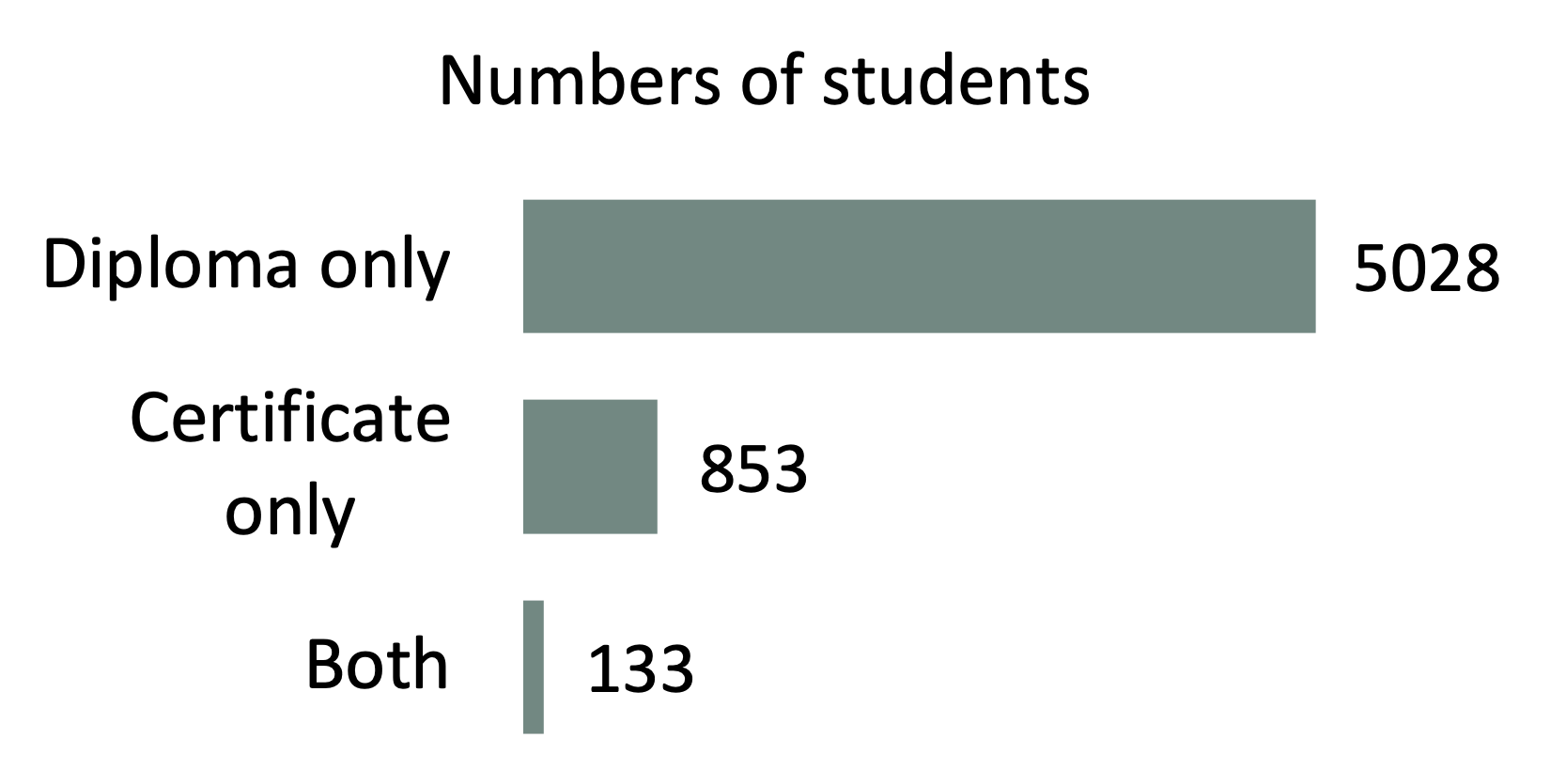
Figure 1. Students in the Diploma of Sustainable Living and Undergraduate Certificate of Sustainable Living since inception.
The Diploma commenced in late 2018, and the Certificate commenced in 2020. The Diploma involves completing 1 year full time equivalent, including compulsory introductory and capstone units plus six other units selected from 20 electives (Table 1, below). The Certificate involves the introductory unit and three electives (six months full time equivalent). Most students study the courses part time, and the Certificate can act as a pathway to the Diploma.
The courses and units are highly multidisciplinary, and are fine-tuned to help students understand sustainability, building up from the United Nations Sustainable Development Goals. The electives cover a diverse range of themes and focus strongly on using the familiar (your own backyard or work) to learn general principles. They derive their knowledge from a diverse range of disciplines: marine and terrestrial biology, governance, philosophy, media studies, physics, earth sciences, health studies, indigenous studies and architecture and design. The focus ranges from personal to global levels, and from purely theoretical to highly applied.
Table 1. Units in the Diploma and Undergraduate Certificate in Sustainable Living. * = only available in the Diploma.
| Unit name | Key aspects of the unit |
|---|---|
| Communicating Sustainability HEJ111 | Compulsory introductory unit on sustainability communication |
| *Local Lives for a Sustainable Planet KGA107 | Compulsory capstone unit on sustainability in your own life |
| Humans: Earth Shapers XBR112 | Science, ethics, and governance of human impacts |
| Sustainability ZAS118 | Economics of sustainability |
| Backyard Biodiversity KPZ006 | Biodiversity sustainability issues |
| Introduction to Sustainable Design for Houses KDA101 | Key concepts of sustainable housing |
| Sustainable Design for Houses and Landscapes KDA102 | Creating sustainable houses and landscapes |
| Introduction to the Science of Climate Change KGA104 | Evidence base for why climate change is real |
| Responding to Climate Change KGA105 | Basic skills for how to respond to climate change |
| Global Food Security XBR103 | How we can feed current and future generations |
| Living with Fire KPZ104 | Wildfire and how this relates to sustainable lives |
| Science of Gardening KPZ001 | The scientific basis of how plants work |
| Science of Gardening 2 KPZ003 | How gardens function as ecosystem |
| Living and Working with Cultural Diversity CZZ104 | Real world issues relating to culture |
| Science of Fishing 1 KSM002 | Sustainable fishing and responsible fishing |
| *Science of Fishing 2 KSM003 | Informed decisions for sustainable fishing, |
| *Energy XBR117 | Scientific understanding of sustainable energy use |
| *Engaging with Sustainability HUM111 | Critically thinking about sustainability |
| *Indigenous Lifeworlds: Sovereignty, Justice, Society HSS113 | Indigenous lived realities |
| *Developing Your Creative and Entrepreneurial Potential XBR102 | Skills to create and manage projects |
| *Understanding Science ZAS112 | How science works and relates to sustainability |
| *Complementary Medicines in Contemporary Society CSA120 | Critically appraise complementary medicine |
> Environmental and social benefits
The multidisciplinary nature of the courses and the breadth of content help students learn from different viewpoints about all aspects of sustainability. The Diploma has had extensive positive social outcomes and environmental outcomes by inspiring change in how students/graduates behave both in their personal lives and in their work. The most common impacts shown in student feedback are:
- Changing perspectives and viewpoints across a wide range of aspects of sustainability
- Encouraging greater appreciation for the environment and creating skills/knowledge to help protect it
- Increasing awareness of the importance of cultural sustainability, including Indigenous practices
- Providing knowledge that can be applied in careers, e.g., urban planning, agriculture, publishers, etc.
- Providing skills to communicate with councils, community groups, farmers, and people from different cultures
- Providing skills and knowledge used in current and future businesses
- Encouraging students to establish businesses and enterprises, community groups and partnerships with councils
- Encouraging volunteering for local communities (e.g., local rural fire services)
- Encouraging students to pursue a career in sustainability
- Inspiring further education
- Providing knowledge and skills for students to build homes suited to their environment
- Increasing awareness of bushfires and encouraging many to undertake training in bushfire hazard assessment
These outcomes are demonstrated by a small sample of the large number of favourable student testimonials, including:
“… I have gained a wealth of knowledge I can apply to my work as an urban planner and personal life as my partner and I start the arduous process of buying a new home and selling our current one.” Feedback from Introduction to Sustainable Design for Houses.
“…I intend to have a few long chats with the people at [redacted] Regional Council and hope my research may help. I have a strong background in agriculture [and finance] and intend to chat to the farmers and see if I can offer some suggestions about hydroponics, as this would offer them a permanent supply of [some types] fresh veges.” Feedback from Communicating Sustainability.
“I am actually about to commence bushfire hazard assessment training at the behest of my company looking to qualify eventually to be able to draft compliant reports. Without this unit, I would not have thought it was something I was capable of doing. So thank you.” Feedback from Living with Fire.
“I am pursuing a degree now (rather than only a diploma) inspired in part by your kindness and by what I have learned in this” Feedback from Backyard Biodiversity
“As a result of this study my husband (also studying this unit) and I have joined our local Rural Fire Service, and we’re look forward to undertaking training to become fire-fighting members. We are going to see if we can encourage better burning practices in our semi-rural/agricultural community.” Feedback from Living with Fire.
The courses have had important societal impacts by increasing the access of low and medium socio-economic status members of society to education. Thus, DSL Students come from a wide range of socio economic status (see Figure 2), at least 12% being of low socio economic status. Many of these students were able to take the Diploma due to the availability of fee waivers.
Figure 2: Socio Economic Status Diploma of Sustainable Living students (by %)
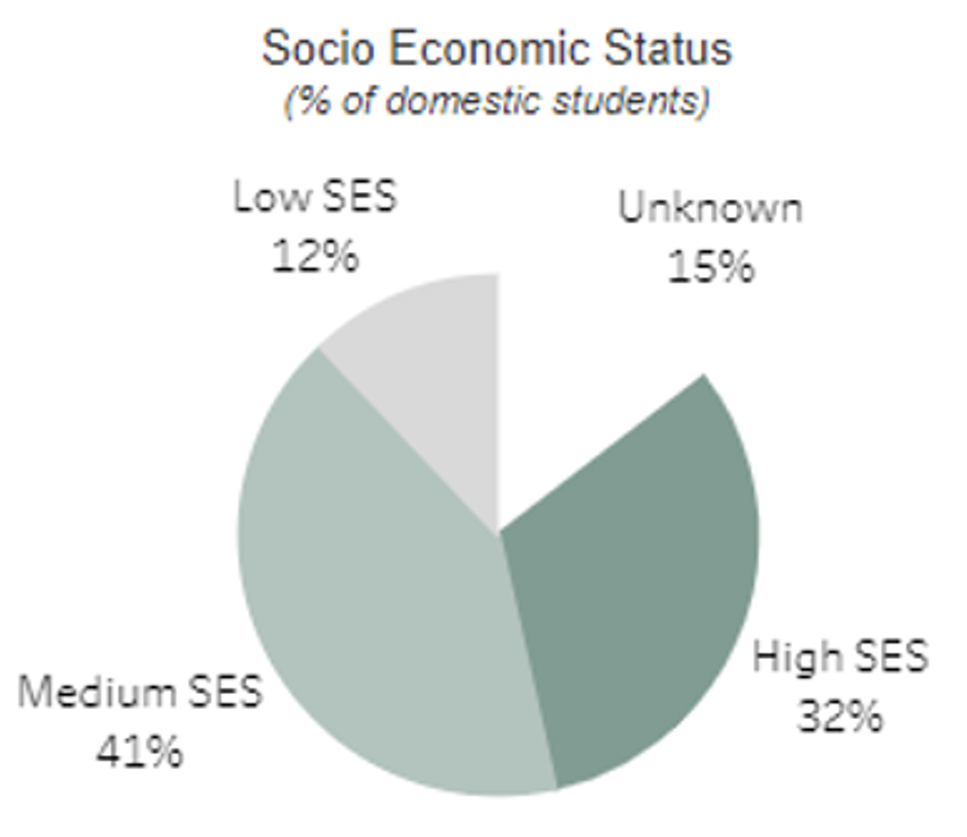
> Leadership and engagement
This proposal is highly distinctive because, to the best of our knowledge, the Diploma and Undergraduate Certificates of Sustainable Living are the only fully online courses in sustainable living in Australia, and the only courses below degree level (AQF7) that cover sustainability broadly. There are higher level online courses in sustainability, but these are specialised: a Graduate Certificate (or Graduate Diploma) in Public and Environmentally Sustainable Health, and a Master of Public and Environmentally Sustainable Health at University of Notre Dame; and a Master of Laws Specialisation Sustainable Development at the University of Southern Queensland. Similarly, the University of Wollongong offers Bachelor of Sustainable Communities and a Bachelor of International Studies (Global Sustainable Development); and RMIT University offers a Bachelor of Fashion and Textiles (Sustainable Innovation).
Thus, none of the sustainability-related courses delivers similar content to the Diploma and Undergraduate Certificates of Sustainable Living, and therefore this is a distinct offering within Australia. This is clearly shown by the excellent reach into regional areas (Figure 3).
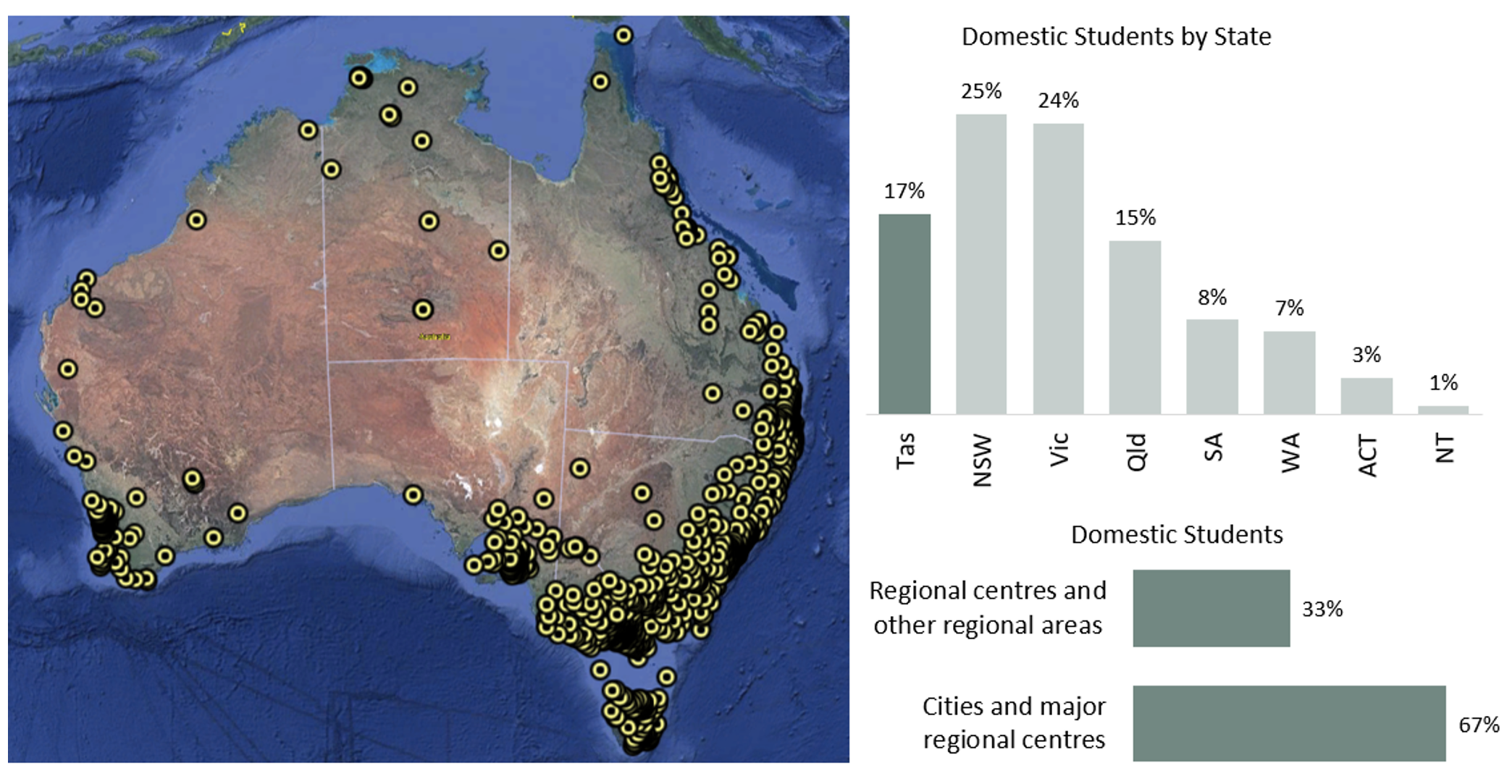
Figure 3. Map of postcodes of home addresses of Australian-based students in the Diploma and Undergrad Certificate, plus proportions of students per state and proportions of students in cities and major regional centres versus regional centres and other regional areas, as defined by the Department of Home Affairs.
> Significance to the sector
We can find no universities offering a diploma or undergraduate certificate relating to holistic sustainability either in Australia or internationally. Ten international universities (in USA, Ireland, UK, and Canada) offer bachelors degrees in sustainability. As such we believe that the Diploma and Undergraduate Certificate are highly distinctive.
The teaching styles of the units are highly diverse, offering the students a wide range of learning experiences. However, all are highly interactive, variously using tutorials, group work, active discussion groups and forums. This has received glowing feedback, of which some typical examples are:
- “I liked the learning style, it was very open, inclusive and conversational” Feedback from Global Food Security
- “The most helpful aspects of the unit were its breadth of content and the diversity of learning devices that were used” Feedback from Engaging with Sustainability
We believe the Diploma and Undergraduate Certificate has been particularly effective in helping remote students feel included. Success in this challenging task, is down to passionate, caring, and enthusiastic staff running the units, for example:
- “the understanding of personal situations regarding watching the large lectures due to the restricted internet on a remote island was amazing” Feedback from Global Food Security
The flexible structure of the course, often self-paced or with tutorials happening at multiple times of the day, allows those with busy lifestyles to learn in their own time (e.g., those with young children or full-time jobs):
- “…. I also really appreciate that the course is self -paced, allowing me to jump in and out at times that suit me ( Very handy with two small children on school holidays!)” Feedback from Introduction to Sustainable Design for Houses
“I am telling my friends to come to do this course too. I have three kids and all the units are so flexible around my life” Feedback from Sustainability
> Wider societal impact
The wider societal impacts have been discussed earlier in the section on environmental and social benefits (above). The key impacts relate to providing education in both the theory and the practice of a wide range of aspects of sustainability to a large cohort of students, many of which are outside the range of conventional university undergraduate teaching. In particular, the courses have very strong reach into regional areas, and access different age cohorts from standard university offerings, particularly attracting students between 30 to 50 years old.
As mentioned above, the fully online courses provided opportunities for meaningful learning during periods of COVID-19 lockdown. Thus, the lockdowns had a silver lining – they allowed wider learning about sustainability. For example, over 1,000 Victorian students participated in the courses during 2020 and 2021 when the state was largely in lockdown.
> Learner/Graduate employer impact
As discussed earlier, the courses have had substantial impacts on how people do their work by providing specific job relevant skills and knowledge. However, increased understanding of the diverse aspects of sustainability alone should initiate changes in workplaces both through a greater capacity to perceive problems and their potential impacts – you can’t solve problems if you don’t know they exist – and through a greater awareness of the range of approaches to solving problems. The multidisciplinarity of the courses is critical here, because this makes graduates aware that solutions can be created via different lenses, be they scientific, governance-related, or from different cultural or philosophical perspectives.

